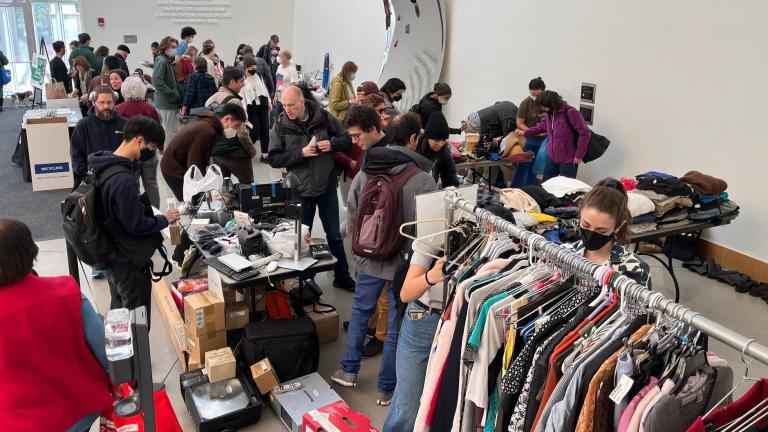
April 22 marks the arrival of Earth Day, which provides all of us with a good reason to think of ways to live more sustainably. For more than 20 years, the MIT Working Green Committee has helped community members do just that by encouraging the reuse and recycling of possessions.
Made up entirely of volunteers, the committee has played an important role in promoting more sustainable operations at MIT and raising awareness of the importance of conservation.
“We try to provide a place for people to learn how to live and work in a more environmentally friendly way,” says committee co-chair Rebecca Fowler, a senior administrative assistant in MIT’s Office of Sustainability.
The committee hosts regular Choose to Reuse events to give MIT’s community members a chance to donate unwanted items — or find free things that just might become prized possessions. It also provides resources to help host more sustainable events, make more sustainable purchasing decisions, and learn more about recycling.
“The recycling industry is very frustrating, so people are always asking what to do,” Fowler says. “They feel like they make the wrong decisions and just want to know how to do it. We get a lot of questions, and we’re always there to help find answers.”
Committee members say they’ve realized devoting a little time each month to things like recycling education, and hosting events can make a big difference in reducing waste. In last month’s Choose to Reuse event, more than 100 people dropped off thousands of items including clothing, housewares, and office supplies. MIT’s always-active Reuse email lists, which the committee encourages community members to join, are another great way to pass gently used items to others who can give them new life.
“The goal is to keep things out of landfills, and the Choose to Reuse event shows you immediate results,” says committee co-chair Gianna Hernandez-Figueroa, who is the assistant to the director at the MIT AgeLab. “It’s inspiring because people are excited to put things in the hands of someone who is going to repurpose it. It’s a circular event that’s really beautiful.”
Choose to Reuse events are typically on the third Thursday of every other month, although the next one — the last for the spring semester — is on Monday, April 24.
The committee is one of the only groups on campus run by support staff, whose responsibilities involve clerical duties, data processing, and library and accounting functions, among other things. It is a subcommittee of the Working Group for Support Staff.
The committee began as the Working Group on Recycling in 2000 at a time when MIT’s recycling rate was around 11 percent. By 2006, MIT had reached a 40 percent recycling rate and received a Go Green Award from the City of Cambridge. That year the committee earned an MIT Excellence Awards for its work.
Around 2011, the group started hosting Choose to Reuse events, which became an instant success.
“I really believe in the gift economy, specifically in academic settings where you have a lot of international students,” Hernandez-Figueroa says. “Plus, Boston is an expensive city!”
For a long time, the group was run by Ruth Davis, who served as MIT’s manager for recycling and materials management and retired last year. Since Davis left, others have stepped up.
“A lot of the volunteers have been around since the first Choose to Reuse event 13 years ago,” Fowler says, adding that the committee is always looking for more volunteers. “They’re all very committed to the event and to the cause.”
The organization is also a way for support staff to gain new skills. Fowler credits her experience working on the committee with improving her project management and website design abilities.
“We really emphasize capacity building,” Fowler says. “If there’s a skill a volunteer would like to develop, we can explore ways to do that through the committee. That’s something I’d like to continue: finding people’s strengths and helping them build their careers.”
Overall, Fowler says the committee aligns with MIT’s commitment to make an impact.
The group’s long history “shows a commitment to environmentalism and sustainability and a yearning to do more beyond what is in your job responsibilities,” she says. “It really shows the commitment to volunteerism of MIT’s staff members.”





